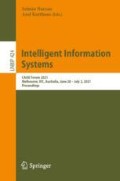Abstract
Alignments pinpoint trace deviations in a process model and quantify their severity. However, approaches based on trace alignments use crisp process models and recent probabilistic conformance checking approaches check the degree of conformance of an event log with respect to a stochastic process model instead of finding trace alignments. In this paper, for the first time, we provide a conformance checking approach based on trace alignments using stochastic Workflow nets. Conceptually, this requires to handle the two possibly contrasting forces of the cost of the alignment on the one hand and the likelihood of the model trace with respect to which the alignment is computed on the other.
Access this chapter
Tax calculation will be finalised at checkout
Purchases are for personal use only
References
Adriansyah, A., van Dongen, B.F., van der Aalst, W.M.P.: Conformance checking using cost-based fitness analysis. In: EDOC 2011, pp. 55–64. IEEE (2011)
Altman, N.S.: An introduction to kernel and nearest-neighbor nonparametric regression. Am. Stat. 46(3), 175–185 (1992)
Bergami, G., Bertini, F., Montesi, D.: Hierarchical embedding for DAG reachability queries. In: IDEAS, pp. 24:1–24:10. ACM (2020)
Driessens, K., Ramon, J., Gärtner, T.: Graph kernels and gaussian processes for relational reinforcement learning. Mach. Learn. 64(1–3), 91–119 (2006). https://doi.org/10.1007/s10994-006-8258-y
Gärtner, T.: A survey of kernels for structured data. SIGKDD 5(1), 49–58 (2003)
Gärtner, T., Flach, P., Wrobel, S.: On graph kernels: hardness results and efficient alternatives. In: Schölkopf, B., Warmuth, M.K. (eds.) COLT-Kernel 2003. LNCS (LNAI), vol. 2777, pp. 129–143. Springer, Heidelberg (2003). https://doi.org/10.1007/978-3-540-45167-9_11
Leemans, S.J.J., Syring, A.F., van der Aalst, W.M.P.: Earth movers’ stochastic conformance checking. In: Hildebrandt, T., van Dongen, B.F., Röglinger, M., Mendling, J. (eds.) BPM 2019. LNBIP, vol. 360, pp. 127–143. Springer, Cham (2019). https://doi.org/10.1007/978-3-030-26643-1_8
de Leoni, M., Marrella, A.: Aligning real process executions and prescriptive process models through automated planning. Expert Syst. Appl. 82, 162–183 (2017)
Lodhi, H., Saunders, C., Shawe-Taylor, J., Cristianini, N., Watkins, C.J.C.H.: Text classification using string kernels. J. Mach. Learn. Res. 2, 419–444 (2002)
Polyvyanyy, A., Kalenkova, A.A.: Monotone conformance checking for partially matching designed and observed processes. In: ICPM, pp. 81–88 (2019)
Polyvyanyy, A., Solti, A., Weidlich, M., Di Ciccio, C., Mendling, J.: Monotone precision and recall measures for comparing executions and specifications of dynamic systems. ACM Trans. Softw. Eng. Methodol. 29(3), 17:1–17:41 (2020)
Seshadhri, C., Sharma, A., Stolman, A., Goel, A.: The impossibility of low-rank representations for triangle-rich complex networks. Proc. Natl. Acad. Sci. 117(11), 5631–5637 (2020)
Acknowledgments
This research has been partially supported by the project IDEE (FESR1133) funded by the Eur. Reg. Development Fund (ERDF) Investment for Growth and Jobs Programme 2014–2020.
Author information
Authors and Affiliations
Corresponding author
Editor information
Editors and Affiliations
Rights and permissions
Copyright information
© 2021 Springer Nature Switzerland AG
About this paper
Cite this paper
Bergami, G., Maggi, F.M., Montali, M., Peñaloza, R. (2021). A Tool for Computing Probabilistic Trace Alignments. In: Nurcan, S., Korthaus, A. (eds) Intelligent Information Systems. CAiSE 2021. Lecture Notes in Business Information Processing, vol 424. Springer, Cham. https://doi.org/10.1007/978-3-030-79108-7_14
Download citation
DOI: https://doi.org/10.1007/978-3-030-79108-7_14
Published:
Publisher Name: Springer, Cham
Print ISBN: 978-3-030-79107-0
Online ISBN: 978-3-030-79108-7
eBook Packages: Computer ScienceComputer Science (R0)

